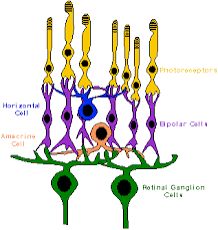Amacrine cells are a type of interneuron in the retina. They play a crucial role in visual processing by:
- Modulating signal transmission: Amacrine cells interact with bipolar cells and ganglion cells, influencing the transmission of visual signals.
- Regulating retinal circuitry: They help refine and process visual information within the retina.
- Inhibitory functions: Many amacrine cells release inhibitory neurotransmitters, such as GABA or glycine, to modulate the activity of other retinal neurons.
Amacrine cells contribute to various aspects of visual processing, including:
- Edge detection
- Motion detection
- Contrast sensitivity
- Adaptation to changing light conditions
There are many subtypes of amacrine cells, each with distinct morphological and functional properties, allowing for complex and nuanced visual processing in the retina.
